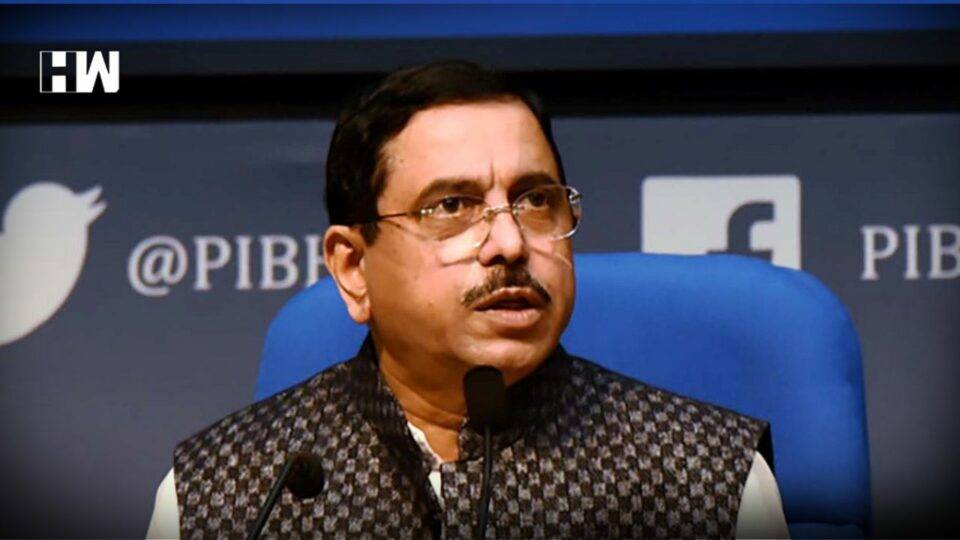Mr. Joshi said that the government had invited around 45 parties to the all-party meeting, of which 36 attended it.
New Delhi: On Sunday which is a day before the start of the monsoon session of Parliament, the government said 32 bills have been indicated by various departments for presentation in two houses of which 14 are ready, even as it asserted that it wants discussions on all of them in a democratic way.
“Thirty-two bills have been indicated by various departments for being presented in this session of Parliament, of which 14 bills are ready, but we will not pass the bills without discussion,” he said while interacting with the reporters.
Mr. Joshi said that the government had invited around 45 parties to the all-party meeting, of which 36 attended it.
“I am thankful to them for participating in the meeting. During the meeting chaired by senior minister Rajnath Singh, they demanded some of the issues to be discussed.
“Some of the issues that were raised included about the words that have been declared as ‘unparliamentary’ and it has been clarified that the compilation of unparliamentary phrases is being done every year for a long time.”Mr. Joshi said.
On the listed business for the monsoon session that will start on July 18 and is scheduled to continue till August 12, Mr. Joshi said, “We have listed 32 bills so that they (opposition) are also prepared and therefore we are giving notice in advance.”He added,
He further said, “All we are saying is that 14 bills are ready and we can consider even more. More importantly, we believe in democratically discussing all the bills. We believe in democracy and we are open for discussions on all matters.”
The bills listed by the government for the upcoming Parliament session include the Multi-State Cooperative Societies (Amendment) Bill, which seeks to rationalize the government’s role in cooperatives and increase participation in the working of multi-state cooperative societies, to increase public faith in them and create a conducive environment for their growth and development according to official documents.
The Insolvency and Bankruptcy Code (Amendment) Bill seeks to strengthen the Insolvency and Bankruptcy Code by introducing provisions on cross-border insolvency and certain other amendments for a time-bound resolution of stressed assets while maximizing their value.
Two separate bills for Constitution amendment to revise the list of Scheduled Castes (SCs) and Scheduled Tribes (STs) for Chhattisgarh and Tamil Nadu are also listed for introduction.
The ‘Press and Registration of Periodicals Bill’ seeks to replace the 155-year-old ‘Press and Registration of Books Act’ with a simplified version that decriminalizes various provisions and brings digital media under its ambit.
The Ancient Monuments and Archaeological Sites and Remains (Amendment) Bill seeks to provide more teeth to the Archeological Survey of India (ASI) and amend a law dealing with ancient monuments. It is also aimed at rationalizing prohibited areas and other amendments.
Another bill listed during the session is the Kalakshetra Foundation (Amendment) Bill, 2022, which seeks to amend the Kalakshetra Foundation Act, 1993 to empower the Kalakshetra Foundation to award certificates; diplomas; post-graduate diplomas; degrees to graduate and post-graduate; doctoral and post-doctoral courses; and conduct research in the areas of dance, traditional theatre, drama, Carnatic and traditional music, visual arts, craft education, and art education.
The Family Courts (Amendment) and Indian Antarctic bills are listed to be taken up in Lok Sabha on Monday, while the Weapons of Mass Destruction and their Delivery Systems (Prohibition of Unlawful Activities) Amendment Bill is listed for consideration and passing on the same day in Rajya Sabha.
Also, the Trafficking of Persons (Protection, Care and Rehabilitation) Bill, 2022 seeks to prevent and combat trafficking, especially among women and children. It also seeks to provide care, protection, assistance, and rehabilitation to the victims, while respecting their rights, creating a supportive legal, economic and social environment for them, and ensuring the prosecution of offenders.
According to the draft bill, a person found guilty of trafficking can be imprisoned for a term not less than seven years that may extend to 10 years.
The convict shall also be liable to a fine, not less than ₹ 1 lakh that may extend up to ₹ 5 lakh. Severe punishment has been proposed for offenses classified as aggravated forms of trafficking.
Several anti-human trafficking activists and NGOs have been pushing for the early passage of the bill in Parliament.
The Cantonment Bill 2022 is expected to bring in measures to ensure that the civilian population living within the cantonments does not face any difficulties. It seeks to enhance efficiency in running cantonments across the country.
As an independent media platform, we do not take advertisements from governments and corporate houses. It is you, our readers, who have supported us on our journey to do honest and unbiased journalism. Please contribute, so that we can continue to do the same in future.

